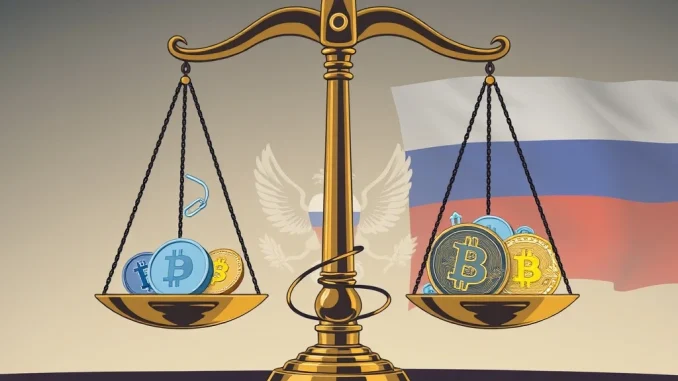
DOJ Unveils Massive $530M Crypto Laundering Scheme by Russian National
In a significant move that underscores the global crackdown on illicit financial activities, the U.S. Department of Justice (DOJ) has unveiled a massive indictment against a Russian national, Iurii Gugnin. He stands accused of orchestrating a staggering $530 million crypto laundering operation, alongside widespread sanctions evasion. This case sends a clear message: the digital realm is not a safe haven for those seeking to bypass international law.
DOJ Charges Unveiled: The Iurii Gugnin Case
The indictment, first reported by Cointelegraph, details 22 serious counts against Iurii Gugnin. He is alleged to have leveraged his crypto firms, Evita Investments and Evita Pay, as sophisticated conduits for illicit funds. The sheer scale of the alleged operation – half a billion dollars – highlights the growing challenge authorities face in monitoring and regulating the cryptocurrency landscape.
Gugnin’s alleged scheme wasn’t just about moving money; it involved a calculated effort to undermine U.S. national security and financial integrity. He is accused of:
- Using Fake Documents: Fabricating false identities and corporate papers to obscure the true origins and destinations of funds.
- Assisting Sanctioned Clients: Actively helping Russian entities and individuals already under U.S. sanctions to circumvent these restrictions. This is a direct affront to international efforts to isolate those who threaten global stability.
- Deceiving Banks: Misleading traditional financial institutions to facilitate transactions that would otherwise be flagged or blocked.
- Acquiring Sensitive U.S. Technology: Illicitly obtaining American technology, likely for purposes that could benefit sanctioned entities or the Russian state.
The severity of these accusations is reflected in the potential penalties. Gugnin faces up to 30 years in prison for each of the 22 charges, a testament to the U.S. government’s resolve in combating such complex financial crimes.
Understanding the Scope of Crypto Laundering
The term crypto laundering refers to the process of concealing the origins of illegally obtained funds by converting them into cryptocurrencies, or vice versa. While cryptocurrencies offer legitimate benefits like speed and decentralization, their pseudo-anonymous nature can unfortunately be exploited by criminals. In Gugnin’s case, his firms allegedly provided a seemingly legitimate facade for these illicit transactions, making it harder for authorities to trace the money’s true path.
Key aspects of such laundering operations often include:
- Mixing Services: Using services that pool and scramble cryptocurrencies from multiple sources to obscure their origin.
- Chain Hopping: Converting funds between different cryptocurrencies to make tracking more difficult.
- Exploiting Decentralized Exchanges (DEXs) and P2P Trading: Utilizing platforms with less stringent Know Your Customer (KYC) and Anti-Money Laundering (AML) checks.
- Shell Companies and Front Businesses: Creating seemingly legitimate businesses, like Evita Investments and Evita Pay, to process funds and provide a veneer of legality.
This case serves as a stark reminder that law enforcement agencies are rapidly developing sophisticated tools and expertise to follow digital money trails, even across complex blockchain networks.
Sanctions Evasion Tactics: How Crypto Was Exploited
The core of Gugnin’s alleged scheme revolved around sanctions evasion. Sanctions are economic penalties imposed by countries (like the U.S.) on other nations, entities, or individuals to achieve specific foreign policy or national security objectives. When Russia invaded Ukraine, the U.S. and its allies imposed sweeping sanctions aimed at crippling the Russian economy and limiting its ability to wage war.
Criminals often turn to cryptocurrencies to bypass these restrictions because:
- Reduced Intermediary Control: Unlike traditional banking, which relies on regulated financial institutions that enforce sanctions, crypto transactions can be conducted peer-to-peer, making them harder to intercept.
- Global Reach: Cryptocurrencies are inherently global, allowing for transfers across borders without direct reliance on the SWIFT system or other traditional banking networks.
- Perceived Anonymity: While blockchains are transparent, identifying the real-world identities behind wallet addresses can be challenging without cooperation from exchanges or service providers.
Gugnin’s alleged use of fake documents and deception highlights a common tactic: blending crypto’s perceived anonymity with traditional financial fraud to create a highly effective evasion mechanism. This case underscores the urgent need for international cooperation and robust regulatory frameworks to prevent crypto from becoming a primary tool for state-sponsored illicit activities.
The Broader Implications for Russian Crypto Operations
This indictment is not an isolated incident but rather part of a broader, intensified effort by global authorities to target illicit Russian crypto operations. Since the invasion of Ukraine, there has been heightened scrutiny on how cryptocurrencies might be used to circumvent sanctions, fund military efforts, or engage in other forms of financial crime linked to the Russian state or its sanctioned oligarchs.
Governments worldwide are increasingly concerned about:
- Funding Illicit Activities: The use of crypto to fund cyberattacks, disinformation campaigns, or proxy wars.
- Capital Flight: Sanctioned individuals or entities moving vast sums of wealth out of traditional financial systems and into crypto.
- Maintaining Economic Stability: Russia potentially using crypto to prop up its economy in the face of international isolation.
The Gugnin case sends a strong signal to anyone considering using cryptocurrencies to facilitate such activities: law enforcement agencies are actively monitoring and pursuing these networks, regardless of their complexity or the digital nature of the transactions.
What Does This Mean for the Future of Crypto Regulation?
The ongoing enforcement actions, including these significant DOJ charges, will undoubtedly accelerate discussions and potentially new legislation around cryptocurrency regulation. Governments are grappling with how to balance innovation with the imperative of national security and financial stability.
Expect to see increased focus on:
- Enhanced KYC/AML Requirements: Stricter rules for crypto exchanges and service providers to verify customer identities and monitor transactions.
- International Cooperation: Greater collaboration between law enforcement agencies across borders to track and seize illicit crypto assets.
- Technological Advancements: Development of more sophisticated blockchain analytics tools to trace funds and identify suspicious activity.
- Targeted Sanctions: Expanding sanctions to include specific crypto addresses or entities involved in illicit finance.
While the crypto community often champions decentralization and privacy, cases like Gugnin’s highlight the undeniable need for robust regulatory oversight to prevent abuse and protect the integrity of the global financial system. The industry itself has a role to play in self-regulation and cooperation with authorities to foster a safer environment.
Conclusion: A Clear Message Against Financial Misconduct
The indictment of Iurii Gugnin on charges of $530 million crypto laundering and sanctions evasion is a landmark event. It powerfully demonstrates the U.S. Department of Justice’s commitment to pursuing financial criminals, no matter how complex their schemes or how digital their methods. This case serves as a critical reminder that while cryptocurrencies offer transformative potential, they are not beyond the reach of the law.
For individuals and businesses operating in the crypto space, the message is clear: vigilance, compliance with regulations, and adherence to ethical standards are paramount. As authorities continue to refine their capabilities, the net is tightening around those who seek to exploit the digital frontier for illicit gain, ensuring accountability in an increasingly interconnected world.
Frequently Asked Questions (FAQs)
Q1: Who is Iurii Gugnin and what are the main charges against him?
A1: Iurii Gugnin is a Russian national who has been indicted by the U.S. Department of Justice on 22 counts. He is accused of laundering $530 million through his crypto firms, Evita Investments and Evita Pay, and engaging in sanctions evasion by helping sanctioned Russian clients bypass U.S. restrictions, deceive banks, and acquire sensitive U.S. technology.
Q2: How did Iurii Gugnin allegedly use crypto for laundering and sanctions evasion?
A2: Gugnin allegedly used his crypto firms, Evita Investments and Evita Pay, as fronts to process illicit funds. He reportedly used fake documents to mask the identities of sanctioned Russian clients, allowing them to move money and acquire technology despite U.S. restrictions. The use of crypto provided a perceived layer of anonymity and facilitated cross-border transfers outside traditional financial scrutiny.
Q3: What are the potential penalties Iurii Gugnin faces?
A3: Iurii Gugnin faces significant legal consequences. He could face up to 30 years in prison for each of the 22 charges he has been indicted on, reflecting the severe nature of the alleged financial crimes and national security implications.
Q4: How does this case impact the perception and regulation of cryptocurrencies?
A4: This case reinforces the urgent need for stricter cryptocurrency regulation, particularly regarding Know Your Customer (KYC) and Anti-Money Laundering (AML) protocols. It highlights that authorities are actively monitoring and prosecuting illicit activities involving crypto, pushing for greater transparency and accountability in the digital asset space to prevent its misuse for financial crime and sanctions evasion.
Q5: What is the significance of the Department of Justice’s involvement in such cases?
A5: The DOJ’s increasing involvement signifies a heightened focus by U.S. law enforcement on combating financial crime in the crypto sector. It demonstrates their growing capability to investigate complex digital money trails and prosecute individuals who exploit cryptocurrencies for illegal purposes, sending a strong deterrent message globally.
Q6: What is the difference between crypto laundering and sanctions evasion in this context?
A6: Crypto laundering refers to the process of disguising the illegal origin of funds using cryptocurrencies. Sanctions evasion, in this context, is the specific act of bypassing economic restrictions imposed by governments (like the U.S.) on certain entities or individuals, often using methods like crypto laundering to facilitate these prohibited transactions. Gugnin is accused of both, using crypto laundering as a means to achieve sanctions evasion.
Related News
- Binance Delists 23 Spot Trading Pairs: Critical January 20 Update for Crypto Traders
- These Are the Top Trending Cryptocurrencies by Social Media Mention Frequency (Santiment)
- BlockDag (BDAG) Price Prediction: BDAG Could Smash ATHs As Top Crypto Presale Pepe Dollar Attracts More Whale Investors To ICO
Related: Tokenized Real Estate: WLFI's Groundbreaking Move into Luxury with Trump Maldives Deal
Related: UNUS SED LEO and Gold Tokens Surge as Investors Seek Deflationary Havens
Related: Uniswap Proposal Unveils Ambitious Plan to Activate Protocol Fees on All V3 Pools



